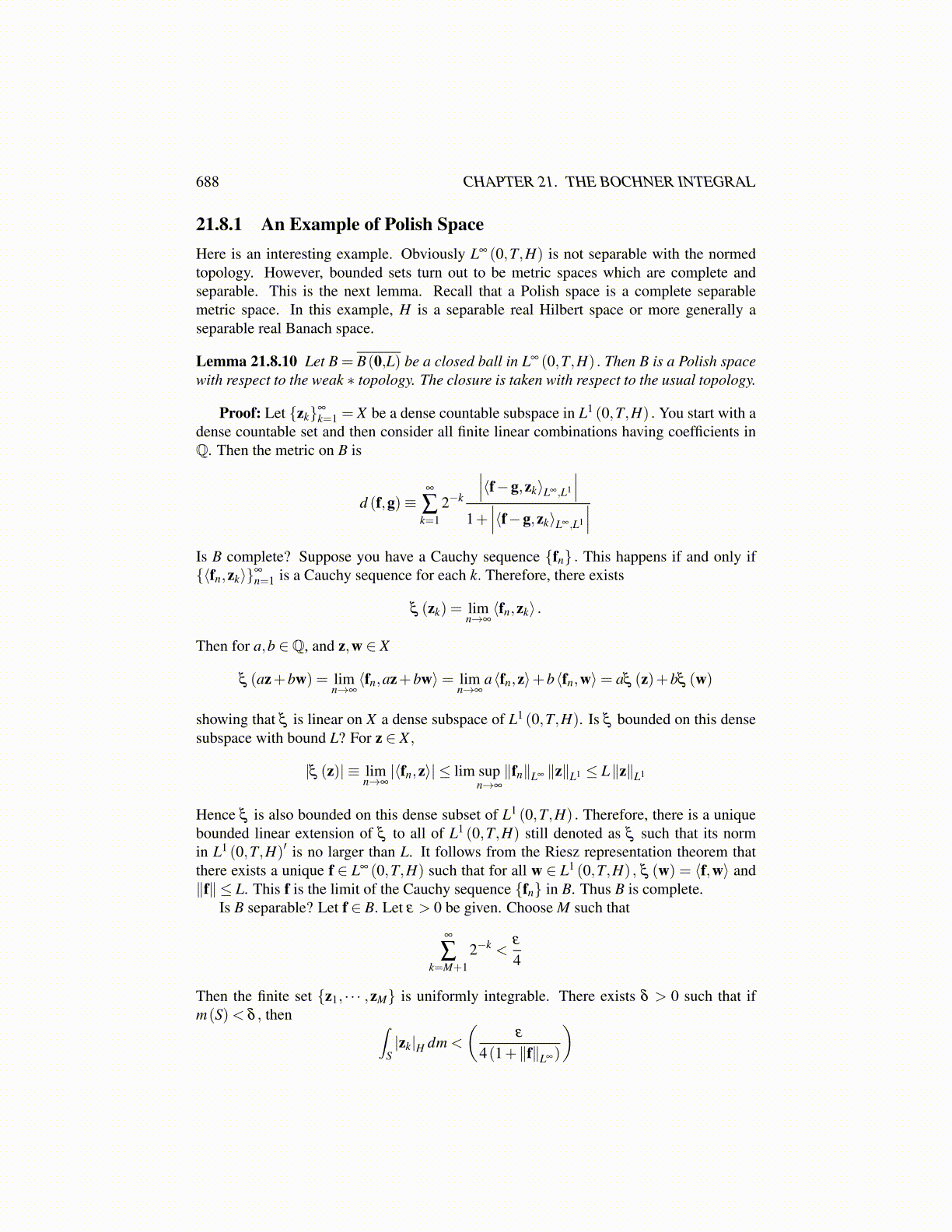
688 CHAPTER 21. THE BOCHNER INTEGRAL
21.8.1 An Example of Polish SpaceHere is an interesting example. Obviously L∞ (0,T,H) is not separable with the normedtopology. However, bounded sets turn out to be metric spaces which are complete andseparable. This is the next lemma. Recall that a Polish space is a complete separablemetric space. In this example, H is a separable real Hilbert space or more generally aseparable real Banach space.
Lemma 21.8.10 Let B = B(0,L) be a closed ball in L∞ (0,T,H) . Then B is a Polish spacewith respect to the weak ∗ topology. The closure is taken with respect to the usual topology.
Proof: Let {zk}∞
k=1 = X be a dense countable subspace in L1 (0,T,H) . You start with adense countable set and then consider all finite linear combinations having coefficients inQ. Then the metric on B is
d (f,g)≡∞
∑k=1
2−k
∣∣∣⟨f−g,zk⟩L∞,L1
∣∣∣1+∣∣∣⟨f−g,zk⟩L∞,L1
∣∣∣Is B complete? Suppose you have a Cauchy sequence {fn} . This happens if and only if{⟨fn,zk⟩}∞
n=1 is a Cauchy sequence for each k. Therefore, there exists
ξ (zk) = limn→∞⟨fn,zk⟩ .
Then for a,b ∈Q, and z,w ∈ X
ξ (az+bw) = limn→∞⟨fn,az+bw⟩= lim
n→∞a⟨fn,z⟩+b⟨fn,w⟩= aξ (z)+bξ (w)
showing that ξ is linear on X a dense subspace of L1 (0,T,H). Is ξ bounded on this densesubspace with bound L? For z ∈ X ,
|ξ (z)| ≡ limn→∞|⟨fn,z⟩| ≤ lim sup
n→∞
∥fn∥L∞ ∥z∥L1 ≤ L∥z∥L1
Hence ξ is also bounded on this dense subset of L1 (0,T,H) . Therefore, there is a uniquebounded linear extension of ξ to all of L1 (0,T,H) still denoted as ξ such that its normin L1 (0,T,H)′ is no larger than L. It follows from the Riesz representation theorem thatthere exists a unique f ∈ L∞ (0,T,H) such that for all w ∈ L1 (0,T,H) , ξ (w) = ⟨f,w⟩ and∥f∥ ≤ L. This f is the limit of the Cauchy sequence {fn} in B. Thus B is complete.
Is B separable? Let f ∈ B. Let ε > 0 be given. Choose M such that
∞
∑k=M+1
2−k <ε
4
Then the finite set {z1, · · · ,zM} is uniformly integrable. There exists δ > 0 such that ifm(S)< δ , then ∫
S|zk|H dm <
(ε
4(1+∥f∥L∞)
)